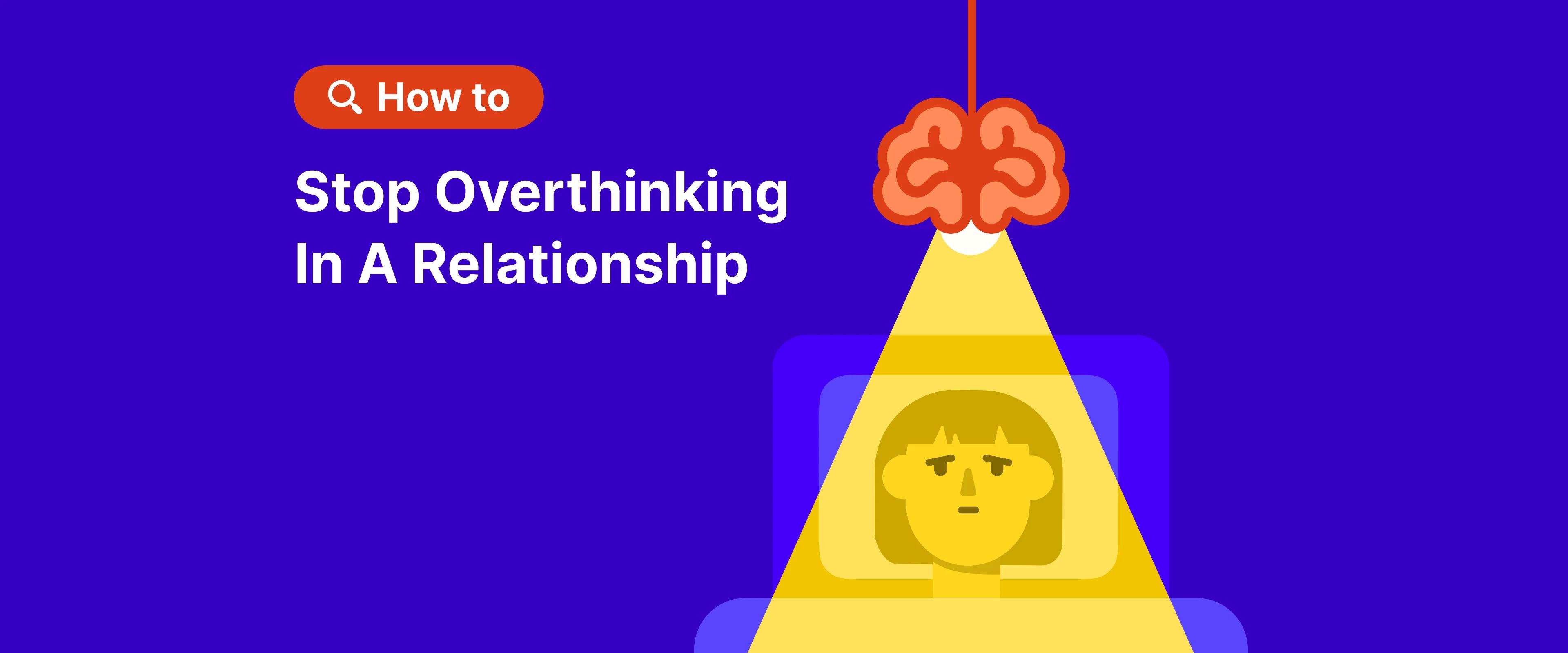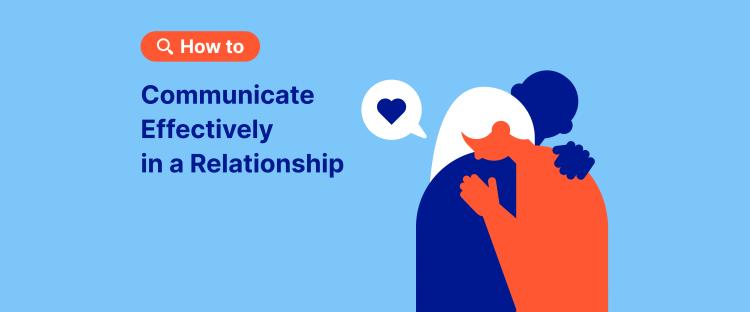Romantic relationships can be exciting and fun, but they can also make you feel nervous from time to time. If you’ve ever spent too much time worrying about what your partner meant or if you’re doing enough, you’re not alone. Many people feel this way, especially when they care a lot yet feel unsure about their relationship.
In today’s world, texting and social media make overthinking even worse. A short message can seem unclear, and seeing "perfect" relationships online might make you question your own. If this sounds familiar, don’t worry — you can take control of your thoughts. Let’s examine why overthinking happens and how to address it with simple, trauma-informed tools.
What is relationship anxiety?
Relationship anxiety is the feeling of worry or insecurity about your relationship. You might overanalyze what your partner says or does, replay conversations in your head, or worry about things going wrong, like your partner leaving. As we read in 'Anxiety in Relationship' by Theresa Miller, these patterns of overthinking often stem from deeper fears and insecurities.
While it’s normal to have doubts sometimes, constant overthinking can hurt your well-being and create tension in your relationship. It can even affect your body, making your muscles tight, your heart race, or your mind unable to focus on anything else.
How does overthinking affect your relationship?
When you get stuck in overthinking, your thoughts can spiral out of control. For example, if your partner says, "I’ll text you later," you might spend hours worrying about why they didn’t text sooner. Over time, it will be hard to enjoy your relationship and stay in the present moment.
Often, overthinking comes with unhealthy thinking patterns, such as:
Catastrophizing: always expecting the worst to happen
Rumination: replaying the same worries over and over
Overanalyzing: looking too deeply into simple actions or words
For example, one client I worked with, let’s call her Maya, often replayed conversations from her dates. If her partner seemed distracted, she assumed they were losing interest and worried about their future together. Recognizing these patterns is the first step to breaking them.
Trauma and attachment styles: Why do we overthink in relationships?

Overthinking in relationships often stems from fears or insecurities rooted in past experiences. Trauma, especially from childhood or past relationships, can shape how one thinks and feels about romantic connections.
Attachment styles also play a role:
Anxious attachment style: the fear of being abandoned and a need for constant reassurance, leading to overthinking or obsessing
Avoidant attachment style: pulling away and analyzing situations from a distance instead of dealing with emotions directly
Trauma can also change how you see the world. If you’ve experienced betrayal or neglect, you might fall into one of three patterns:
All-or-nothing thinking: believing your relationship is either perfect or doomed.
Personalization: blaming yourself for every problem.
Magnification: blowing minor issues out of proportion.
Understanding these patterns can help you treat yourself with kindness and start making sustainable adjustments. For more help, 'How to Stop Worrying and Start Living' by Dale Carnegie offers practical advice on overcoming negative thoughts and creating healthier, happier relationships.
How trauma affects the nervous system in relationships
Trauma doesn't just affect your thoughts; it lives in the body, too ('The Body Keeps The Score' is a classic book on trauma). The autonomic nervous system, which controls your fight-or-flight response, can play a significant role in relationship anxiety. If something triggers you, like a delayed text, your body might react as if there’s a real danger. You might feel panicked, disconnected, or on edge. This reaction is common for people with traumatic histories. The first step to regaining inner balance is learning to notice when your body feels this way.
Trauma often creates a state of hypervigilance. When you are always on the lookout for signs of trouble, even small, harmless actions by your partner can feel overwhelming. Trauma offers room for distortions and hidden meanings. Over time, this can erode the trust and intimacy in your relationship. Recognizing these triggers allows you to pause and choose healthier ways to respond.
The influence of cultural and social expectations

Cultural and societal messages can make overthinking worse. Romantic movies often show unrealistic love stories and trauma bonds. If you watch closely, you might notice how, for decades, the media has been glorifying toxic relationship patterns, making you question genuine relationships and confusing you.
Social media is also full of photos that make relationships look perfect. For example, you might see a couple’s vacation pictures online and wonder why your relationship isn’t as exciting. But remember, what you see online is usually just the highlights. Real relationships are unique and don’t have to match those images.
Social pressure can definitely add to your anxiety too. If you're constantly comparing your relationship to others or feeling the need to prove something to friends and family, it's easy to fall into overthinking. You can focus on what truly matters in your relationship by stepping back from these influences.
Recognizing unhealthy thinking patterns
Changing something usually starts with becoming very aware of it. Overthinking includes patterns like:
Jumping to conclusions: assuming you know what your partner is thinking.
Mind reading: believing you can guess their feelings without evidence.
Blame shifting: focusing only on your partner’s mistakes.
Interrupt these patterns by asking yourself:
Am I reacting to the present or a past experience?
Is there evidence for this thought, or is it fear-based?
How can I reframe this thought to focus on trust?
Reflection questions to deepen awareness
Self-reflection can help you stop overthinking. Try answering these questions:
What’s one worry that spirals out of control for me?
What physical sensations do I feel when I’m triggered? How can I soothe them?
What advice would I give a friend with the same fear?
Are my fears aligned with the reality of my relationship?
Writing your answers can help you process your thoughts and emotions.
Practical ways to stop overthinking (in a trauma-informed way)

If you’d like to enjoy your relationship more and quit overthinking, estimate your anxiety levels first on a scale of one to ten.
1. Practice mindfulness
This simple grounding exercise brings your attention back to the moment when your anxiety levels are at one to three on a 10-point scale. There are different approaches for more intense anxiety levels.
Mindfulness exercises can help calm your mind and body. However, "being calm" is not the ultimate goal of nervous system regulation. It's important to be able to come back "online" into the present after something triggers your anxiety. Here is how you can focus on the present instead of worrying about the past or future:
Sit in a quiet place and take slow breaths.
Notice five things you can see, four you can touch, three you can hear, two you can smell, and one you can taste.
Mindfulness also means noticing what’s happening in your body. Pause for a moment right now: Are your shoulders tight? Is your breathing shallow? Small check-ins like this can help you stay connected to your body.
2. Challenge negative thoughts
When you catch yourself assuming the worst, ask, "Is this based on facts, or is it my fear talking?" Reframing your thoughts helps you see things more clearly.
You can also try listing evidence for and against your worries. For example, if you’re afraid your partner is losing interest, write down reasons that support and challenge this fear. This process can help you see the situation more objectively. This, as well as a reality check, is where you talk directly to your partner. Choosing to trust your partner’s words versus your projections and fears is a skill to nurture.
3. Communicate with your partner
Clear and honest communication reduces misunderstandings. Use "I feel" statements to share your needs without placing blame. For example:
Instead of saying, "You always ignore my texts," try, "I feel anxious when I don’t hear back because it reminds me of when I was ignored in the past."
Open conversations build trust and allow your partner to understand your perspective. The thing is, they might not realize how their actions affect you until you explain it clearly and kindly.
4. Self-soothing strategies
When your anxiety hits four or five, try comforting yourself with small actions, like:
Holding a soft blanket or stuffed animal.
Giving yourself a hug by wrapping your arms around your body.
Using an app with calming exercises or sounds.
Find your own self-soothing formula by experimenting with all of the above. These steps signal to your body that you’re safe. Re-establishing your internal sense of safety should be your number one priority when feeling relationship anxiety.
5. Use somatic techniques for more intense anxiety
Moving your body can help release tension when anxiety gets out of control. Try:
Progressive muscle relaxation: tense and relax each muscle group.
Vagus nerve activation: hum or splash cold water on your face.
Gentle stretching or shaking out your arms or entire body for two to three minutes to release built-up activation.
Physical activity, even a short walk outside, can provide a mental reset. Nature and fresh air often have a grounding effect on the nervous system, helping you feel safe.
6. After self-regulation, focus on co-regulation
Work with your partner to create emotional safety. It is done both through mental activities as well as verbal. The body receives cues of safety faster than your brain processes verbal cues. Try the following practices:
Spend a few minutes holding hands and taking deep breaths in sync together.
Sit quietly back-to-back or hug each other to reconnect after a stressful day.
Co-regulation can be a powerful way to calm your nervous systems and strengthen your relationship bond.
Expert insight: Esther Perel on overthinking

Relationship expert Esther Perel, author of 'Mating in Captivity,' advises balancing self-reflection with connection. She says,
"When we obsess over our partner’s actions, we lose touch with our own thoughts and feelings."
Perel recommends focusing on self-care activities like journaling, exercising, or spending time with friends. These practices shift your attention from worst-case scenarios to nurturing yourself and your relationship.
Additionally, Perel emphasizes the importance of curiosity over judgment. Instead of criticizing your partner or yourself, approach challenges with a willingness to learn and grow together.
Building emotional safety in relationships
Emotional safety is the foundation of a healthy relationship. It creates an environment where you feel secure, valued, and understood, especially if you have a trauma history. Trauma, in this context, refers to experiences — whether big or small — that overwhelm your ability to cope, leaving a lasting impact on your emotional and psychological well-being. It’s not just about life-threatening events or full-blown PTSD; trauma can also result from chronic emotional neglect, inconsistent caregiving, or feeling unseen and invalidated over time. Many people today, spanning generations from boomers to millennials, carry the weight of such experiences, even if they don't immediately recognize them as trauma.
Emotional safety in a relationship provides a secure space to address these lingering wounds, enabling both partners to feel more open and connected. Here’s how to build it:
Set boundaries: predictable rules and agreements within a relationship can help lower anxiety and create a sense of safety. Clear boundaries let both partners know what is acceptable and what isn’t, reducing the likelihood of misunderstandings or triggers.
Validate feelings: showing empathy and understanding toward your partner’s emotions without judgment or trying to "fix" them communicates that their feelings are valued and respected.
Be consistent: trust grows when words and actions align over time. This reliability helps repair ruptures caused by past experiences of inconsistency or broken promises.
Scheduling a weekly check-in to share your thoughts and feelings can be a powerful tool for fostering emotional safety. During these check-ins, take turns speaking and listening without interrupting. Practice reflective listening by summarizing your partner’s words to ensure they feel heard. This consistent effort builds a deeper understanding of each other and creates the safety needed to nurture a healthy, thriving relationship.
Building self-trust
Trusting yourself can help you stop overthinking. In fact, self-trust is a skill that you can develop over time. Steps to build it include:
Celebrating small decisions you make.
Telling yourself, "My feelings are valid, and I’m doing my best."
Keeping promises to yourself, no matter how small.
As Kamal Ravikant explains in 'Love Yourself Like Your Life Depends on It,' self-trust is deeply connected to self-love. When you nurture this relationship with yourself, you not only feel more confident in handling relationship challenges but also reduce your reliance on external validation. By focusing on your inner wisdom and honoring your own needs, you create a foundation for healthier, more secure connections.
Healing trust issues rooted in trauma

A lack of trust can lead to overthinking. Trauma often creates deep fears of betrayal or abandonment. To rebuild trust:
Start small: focus on consistent, reliable actions.
Address past issues: work with a therapist to understand how old wounds affect your current relationship.
Be patient: healing takes time and effort from both partners.
If you’ve been hurt before, therapy can help you separate past pain from present reality. Opt for somatic therapy over talk therapy if you have a history of trauma. Trust-building activities, like sharing positive memories or creating new rituals, can also strengthen your connection.
The role of professional and community support
Sometimes, relationship anxiety comes from deep trauma that needs professional help. Trauma-informed therapists can guide you through healing and teach coping strategies.

Therapy can help you:
Challenge unhealthy thought patterns.
Develop tools to manage triggers.
Improve communication to build trust.
A therapist provides a safe space to work on these areas at your own pace. But relationships don’t exist in isolation. Having supportive friends or a community can help you gain perspective. For example, a friend might remind you, "You’re overthinking. What’s the kindest way to see this situation?" These external voices can break anxious thought cycles.
Take control of your relationships with the Headway app

Empowering yourself begins with focusing on what you can control. While you cannot dictate your partner’s actions, you have the power to choose your responses, set boundaries, and communicate your needs clearly. This shift fosters healthier, more balanced relationships—and you can start learning how today.
The Headway app offers quick, actionable insights from top books to help you tackle relationship anxiety and overthinking. Discover how self-reflection, mindfulness, and clear communication can counterbalance negative patterns. Instead of questioning your partner’s actions, explore how they align with your values and goals, as shared in expert-backed strategies available on Headway.
Healing is a journey, but you don’t have to navigate it alone. Download the Headway app to access summaries from books that guide you toward secure, fulfilling connections. Every small step brings you closer to peace, joy, and growth. Start transforming your relationships today!
FAQ
Why do I overthink so much in my relationship?
Overthinking often comes from anxiety, fear of loss, or past experiences that caused emotional wounds. It’s your mind trying to predict or prevent pain, even when there’s no real threat in the moment.
Can overthinking ruin a healthy relationship?
Yes. If unchecked, overthinking can create unnecessary tension, miscommunication, and emotional distance. Constant doubt can lead to assumptions and conflict, even when there’s no actual issue.
Is overthinking a sign of insecurity in a relationship?
It can be. Overthinking is often tied to low self-esteem or fear of rejection. Learning to trust yourself and your partner is key to calming mental spirals.
How do I communicate better when I’m overthinking?
Use “I feel” statements and focus on clarity, not blame. Share your thoughts calmly and openly instead of bottling them up or letting them explode after overanalysis.
Can therapy help with relationship overthinking?
Absolutely. Cognitive behavioral therapy (CBT), couples counseling, or even journaling with a therapist’s guidance can help break patterns of rumination and build emotional regulation.
How do I know if I’m overthinking or noticing real problems?
Overthinking feels circular and anxiety-driven, while real concerns have patterns, facts, or unmet needs behind them. If your thoughts lack clarity or context, you’re likely overthinking.
What habits help reduce overthinking in love?
Practicing mindfulness, setting boundaries with intrusive thoughts, staying present during conversations, and focusing on gratitude are all helpful habits. Building self-trust also reduces the need to mentally “check” everything.







